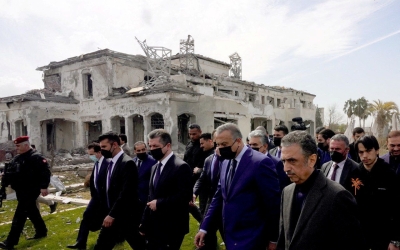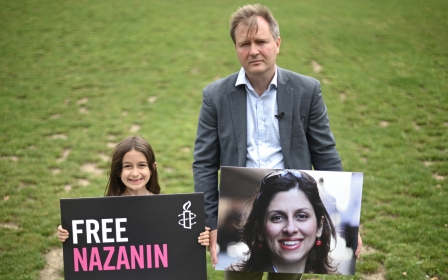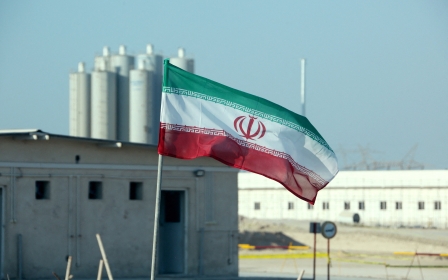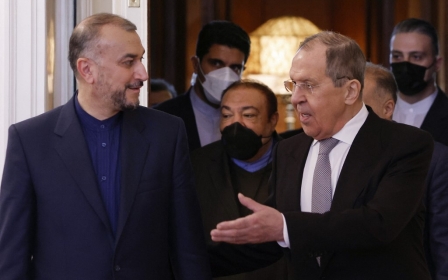Iran: Nazanin Zaghari-Ratcliffe and Anousheh Ashouri flying to the UK
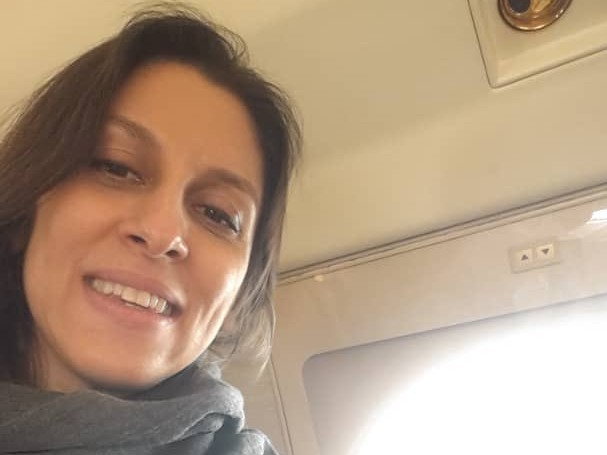
Imprisoned British-Iranian charity worker Nazanin Zaghari-Ratcliffe is returning to the UK after her passport was returned to her in Iran, a British MP tweeted on Wednesday, after the UK paid an outstanding debt owed to Tehran.
Liz Truss, the UK foreign secretary, told Parliament on Wednesday that a debt of £393m ($514m) owed by the UK to Iran since the 1970s for a tank order that was not fulfilled has been paid following negotiations with Iran.
Tulip Siddiqi, MP for Hampstead and Kilburn - where Zaghari-Ratcliffe lived in the UK prior to her detention in Iran in 2016 - tweeted that the former detainee was "at the airport in Tehran and on her way home".
Another UK detainee, Anousheh Ashouri, is also reportedly flying out of Tehran airport.
New MEE newsletter: Jerusalem Dispatch
Sign up to get the latest insights and analysis on Israel-Palestine, alongside Turkey Unpacked and other MEE newsletters
Zaghari-Ratcliffe, a project manager with Thomson Reuters, was arrested in 2016 as she was leaving Iran after taking her then 22-month-old daughter to visit her family.
She was subsequently jailed for five years after being convicted of plotting to overthrow the government.
Then in April last year, she was sentenced to another year's imprisonment over her participation in a rally outside the Iranian embassy in London in 2009.
She was freed from prison with an electronic tag in March 2020 due to the Covid-19 pandemic.
Meanwhile, according to Iran’s judiciary, Ashouri was sentenced to 10 years in jail in 2019 for spying for Israel and two years for “acquiring illegitimate wealth".
Zaghari-Ratcliffe's husband, Richard Ratcliffe, has insisted that the case against his wife is a sham.
He says that she is being used as a bargaining chip by Tehran in order to secure a debt payment from the UK relating to a historic arms deal.
Shortly before the 1979 Iranian revolution that overthrew Shah Mohammad Reza Pahlavi, the British government agreed to sell more than 1,500 Chieftain battle tanks and 250 repair vehicles to Iran.
Iran paid £600m ($795m) for the tanks in advance, but having delivered only 185 tanks, Britain refused to deliver the remaining equipment when the shah was deposed.
The international court of arbitration in The Hague ordered Britain to pay the debt in 2001, a ruling upheld in 2009.
However, the two governments have been locked in a prolonged legal battle in the British courts over the exact sum owed and whether or not the UK should pay interest on it.
On Tuesday, UK Foreign Secretary Liz Truss confirmed that the government had settled the debt “as we said we would.”
“I made resolving the continued detention of British nationals and the IMS [International Military Services] debt payment my top priorities when I entered office in September 2021,” she said in a statement.
“The IMS debt has been settled in full compliance with UK and international sanctions and all legal obligations. These funds will be ring-fenced solely for the purchase of humanitarian goods.”
Iranian Foreign Minister Hossein Amir-Abdollahian confirmed that the UK had paid the debt a few days ago, but denied any link to the freed prisoners, according to Iran's ISNA news agency.
'Political pawns'
Another British national detained in Iran, Morad Tahbaz, is being released from prison on furlough, UK Foreign Secretary Liz Truss confirmed. However there was no suggestion that Tahbaz was returning to the UK.
A fourth British detainee, Mehran Raoof, is not thought to be heading home either, Amnesty International UK told Middle East Eye.
The rights group said it had no further details as to why the two were not being fully released.
In response to the news on Zaghari-Ratcliffe and Ashoori, Amnesty International UK’s CEO Sacha Deshmukh said “this is fantastic news, but it hasn’t come a moment too soon.
“Nazanin and Anoosheh should never have been detained in the first place - they were both jailed on trumped-up national security charges, a familiar tactic in Iran.
“Nazanin and Anoosheh have unquestionably been used as political pawns by the Iranian authorities - and the Iranian authorities have acted with calculated cruelty, seeking to wring the maximum diplomatic value out of their captivity.”
'Nazanin and Anoosheh have unquestionably been used as political pawns by the Iranian authorities'
- Sacha Deshmukh, Amnesty International UK
He added that the UK government needed to follow up by “immediately renewing its calls for the release of the UK nationals Morad Tahbaz and Mehran Raoof, both of whom are still going through an ordeal all too similar”.
Tahbaz, an Iranian-American who also holds British citizenship, was detained in 2018 alongside five other wildlife conservationists accused of spying.
Raoof, a British-Iranian labour rights activist, was arrested in October 2020 and handed a 10-year sentence in August last year on national security charges.
The exact number of British citizens arbitrarily held in Iran is not known.
When pressed on this issue by MEE earlier this year, a spokesperson from the Foreign, Commonwealth, and Development Office (FCDO) said “we do not provide information about numbers of British nationals detained in a country when the low numbers involved may lead to individuals being identifiable".
The FCDO added at the time that it did not wish to connect the issue of the UK's historic debt, or nuclear talks, with the fate of detainees.
“The UK recognises that we legally owe a debt to Iran. It is unhelpful to connect wider bilateral issues with those arbitrarily detained in Iran,” it said.
MEE has reached out to the FCDO for comment on the status of the debt, and whether there was indeed a connection between the two issues.
Middle East Eye delivers independent and unrivalled coverage and analysis of the Middle East, North Africa and beyond. To learn more about republishing this content and the associated fees, please fill out this form. More about MEE can be found here.


